2022 Local Services Champion Paddy Toner. Image: Jon Super
Mohammad Ali once said: “Champions are made from something they have deep inside of them – a desire, a dream, a vision.”
Hundreds of thousands of local government workers across the UK have the skills and training to provide top quality public services. But they also have that inner drive that Ali spoke of, in their case a deep-rooted belief that they can make a difference to people’s lives.
That’s why, every year, UNISON celebrates all its local government members, in particular shining a spotlight on a couple of individuals who embody that profound idea of what it means to be a local service champion.
In 2022, thousands were nominated from across local government sectors and every corner of the UK. They were shortlisted and a jury of five, including UNISON’s general secretary Christina McAnea, picked the winner and runner up.
Paddy Toner
This year’s winner was Paddy Toner, a rehabilitation worker for the visually impaired at Halton Borough Council. Paddy is himself registered blind. He was nominated by Helen Illidge, his support worker.
Helen works with Paddy eight hours a day, five days a week, whether it’s helping with paperwork or driving him to appointments. When asked if they get fed up with each other, she looks over at Paddy and says: “Do we plead the fifth on that one?”
Paddy chimes in from the background: “She should be getting the award, not me!” Helen continues, clearly used to Paddy’s mischievous streak. “What you see and hear from Paddy is what you get. I think he’ll be dead embarrassed, but he’s an inspiration.
“In the [Champions] application I didn’t mention anything about him being visually impaired, so I think it was a bit of a surprise when the jury realised what he’s achieved and how he’s helped people, despite his own disability. It doesn’t stop him.
“I think people look to him as a role model as well. If he can do it, I can do it.”
Paddy’s condition, retinitis pigmentosa, is hereditary and degenerative; he was born with it, and now only has light perception as his sight.
He says: “When I was born in the ‘60s, it wasn’t diagnosed. I could see for miles but couldn’t see under my nose. I thought all kids were the same until I got to a certain age and I thought, ‘Why don’t those kids run into lampposts like me?’ I learnt a lot of skills about being visually impaired without knowing I was visually impaired.”
He went to a college for the blind and qualified in business management, progressing “from not being able to read and write, to reading braille fluently and learnt skills like touch typing, which is vital for me.”
He came out of college and was not able to get employment for two years. “I wasn’t even getting an interview, never mind being employed, because of my visual impairment. So I thought, ‘What profession can I do, that they can’t say I can’t do?’ So, I went to university to become a professional blind man.”
By ‘professional blind man’ Paddy means he qualified as a rehabilitation worker, adding training into the mix of skill and persistence he had already acquired growing up with a visual impairment.
As a rehabilitation worker, his service users are referred to him, often from the NHS or the voluntary sector, having just been registered as partially sighted or blind.
“We go into the person’s home and assess their needs. We look at all aspects of the person’s life, how their visual impairment is impacting their daily living, their mobility, their employment.”
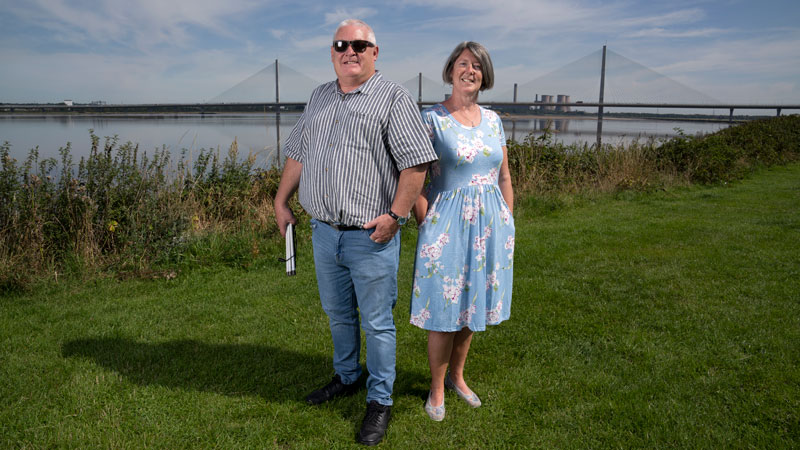
Paddy (pictured above, with Helen) explains that one of the major impacts of the loss of vision is emotional. “We’ve all got preconceived ideas of visual impairment. One of the biggest fears of most people is blindness. So, a priority for me is early intervention. The quicker I can get in, the quicker I can prevent stress, anxiety, and psychological effects.”
He explains that the majority of visually impaired people have some sort of residual vision. “So in a low-vision assessment, part of my job is to get people to use the vision they’ve got, not what they’ve lost. We get a lot of people saying, ‘Oh I can’t do my knitting anymore’ and the first thing I say to them is, ‘Why not? You didn’t use your vision when you knitted anyway, you sat there watching Eastenders.’
“If someone is an avid reader, they read for about 20-30 hours a week. If you lose that, what do you do for those 20-30 hours? So, I’ll start doing the low-vision assessment and within five minutes I’ve got them reading again – and those tears of anxiety turn into tears of joy.
“That’s why the job is such a pleasure to do, it’s a job that just keeps giving. Every day is different. It’s a gift.” Paddy’s work also takes on a practical focus, like teaching the client how to do day-to-day things, whether making themselves a cup of tea or adapting their kitchen to be safer and more suitable for someone with a visual impairment.
When COVID-19 hit the UK, and after two weeks sitting in his house making phone calls to clients, he decided to ask his managers to be classified as a frontline worker.
“It was driving me up the wall. Talking to these people who were stressed was causing me stress. They were saying, ‘I don’t have this, or that, I have no shopping’. And sorry, as a rehabilitation worker I can’t just say, ‘Well, when this is all over I’ll give you a knock.’
“Me and Helen worked out different ways of supporting people – so all the streets were empty and there’s this blind fella in gardens shouting through windows!”
Though Paddy won the award, he’s the first to emphasise that it’s a team effort. “People ask me, what’s Helen’s job? Her title is support worker, but she’s not my support worker, she’s my colleague, she’s my team-mate. We do the job, and we do the job together. There’s no hierarchy in our team. She tells me off all the time! All her focus is on making sure the client is safe. We have a brilliant working relationship, and that’s the way it’s got to be.”
Dawn Hallewell
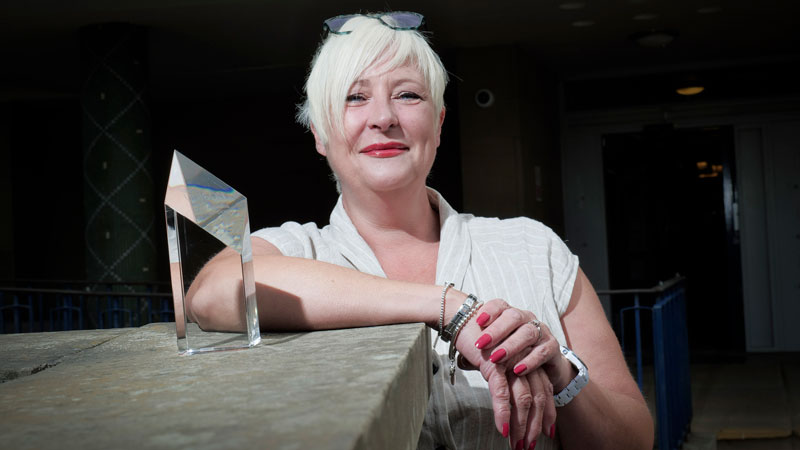
Dawn Hallewell. Image: Mark Pinder
Dawn Hallewell was this year’s runner up. She works as a family support officer for Durham County Council’s youth justice service. When a young person comes into contact with the youth justice system, Dawn says she works with their families “holistically, to give support, to hopefully try and reduce the risk of offending or further offending.”
She was nominated by her manager Keith Appleton, who emphasises her commitment not only to the job, but to the people she works with. He says: “I don’t want to go into cliché mode here, but she goes the extra mile. She’s sorted food banks for parents, she’s sorted bank accounts, she’s been involved in mental health referrals. She really does offer a huge amount of support and that is reflected in the feedback that we get.”
Speaking of her job, Dawn says: “My work is child centred, but parent focussed.” She works with individual parents, assessing their situation and needs across a range of areas – living arrangements of the family, health, schooling, finances, or the ‘toxic trio’ of substance abuse, mental health issues and domestic violence.
“I’ve been called a one-stop shop before,” she says wryly, before going on to highlight the various areas she has been trained in – domestic abuse, child to parent violence and suicide prevention, among others – and explaining how she rolls each of these strands into a coherent and individualised package of support.
She also runs parent support group programmes, which she developed with a colleague in 2016. “There’s a very valid reason we called them parent support groups. It was to break down stigma. If you’re told by a magistrate or a social worker that you’ve got to go on a parenting course, your first thought is that you’re a bad parent, because you have to go on a course to teach you how to be a good one.
“But when you become a parent, it does not come with instructions. Your £10 toaster from Asda comes with a seven-page booklet in 15 languages on how to burn bread. Parents make mistakes and that’s okay. The best people to support parents are parents, and the best people to share knowledge with parents are parents.”
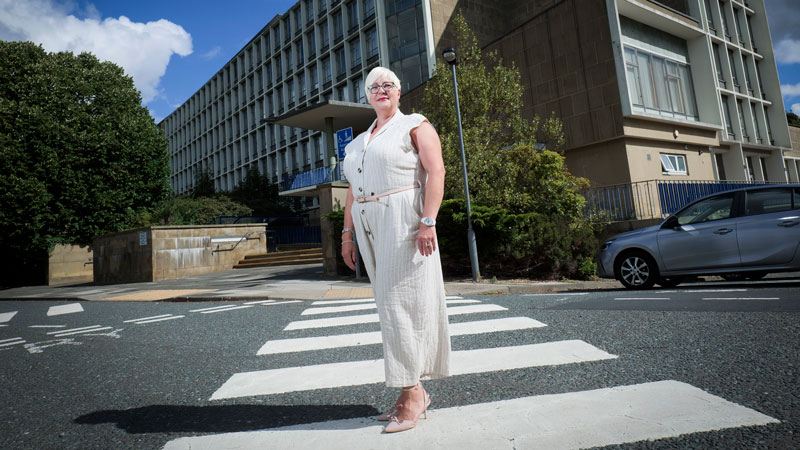
Her work in adapting these parental support groups to a virtual medium during the pandemic is something which Keith particularly highlighted. He says: “She developed Teams-based sessions, which now probably doesn’t seem that innovative. But at the time, when we weren’t really using Teams and video conferencing facilities, it was a bit of a change for us.”
He notes that it would have been relatively easy in Dawn’s case to suspend her work, as it is not a statutorily required area, and praises her persistence. “It wasn’t a case of, ‘Oh, we’ll do some sessions via video conference’, there was a rewrite of a comprehensive programme, making it punchier and more suitable for shorter sessions.”
Dawn says the virtual sessions were something she had in the works prior to the pandemic. “We obviously have clients who have difficulties, whether mental or physical disabilities, some can’t leave the house, some have anxiety. So, it was in the making just before the pandemic, and I’d sort of started tinkering with it the year before.”
When asked if she thinks she has an impact, Dawn says: “Oh god, I’m going to blush! If you want an answer, I would like to think that I increase the life chances of the people I work with. But I don’t know, I just don’t know.
“I just love my job. I literally have the best job in the whole world. I just do, it’s a vocation and this job suits my personality. I am passionate about wanting to improve people’s lives.”

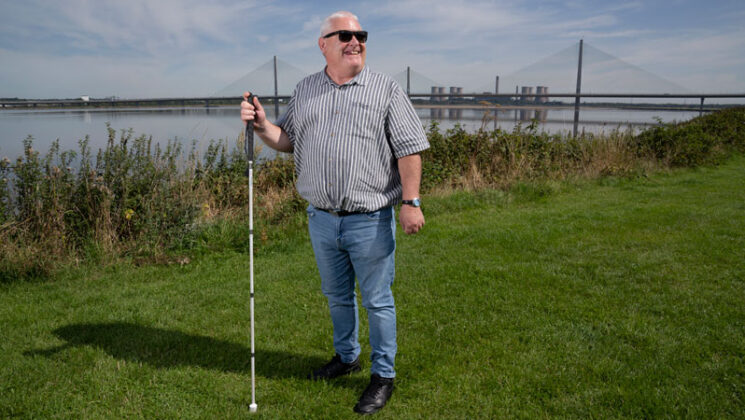



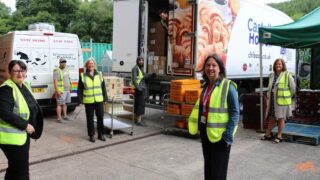
What an inspiration paddy and helen are ,well deserved bravo
What beautiful people I worked with visually impaired adults for 25 years,and know how people react when they finally able to do something they thought they would never do again,you could not put a price on their smile and happines,keep up the Good work you will be rewarded by the happiness you get when they smile at you.xxxxxxxx